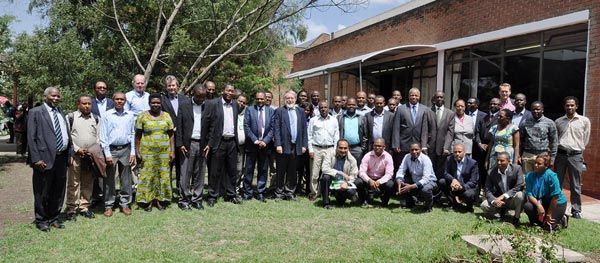By Florence Sipalla/CIMMYT
Identifying the socioeconomic constraints farmers face in adopting a technology is central to ensuring they adopt it sustainably. This is the work that the Pathways to Sustainable Intensification in Eastern and Southern Africa (Adoption Pathways) project is doing in collaboration with partners from national universities and agriculture research systems in Africa and Europe.
Adoption Pathways partners met in Addis Ababa, Ethiopia, on 10-12 April to review activities to date and to plan for 2014. The four-year project is funded by the Australian International Food Security Research Centre (AIFSRC) and managed by the Australian Centre for International Agricultural Research (ACIAR). Project partners from seven institutions collaborating on the project in Ethiopia, Kenya, Malawi, Mozambique and Tanzania attended the meeting.
Participants included policymakers and vice-chancellors from universities as well as donor representatives – John Dixon, ACIAR principal adviser for research/cropping systems and economics and Liz Ogutu, ACIAR regional manager for Africa. Fentahun Mengistu, director general of the Ethiopian Institute of Agricultural Research (EIAR), officially opened the meeting and described the project as one that represents a unique cross-country research and development effort.
“Africa is at the tipping point,” said Dixon, adding that six of the world’s top 10 fastest growing countries are in Africa. Dixon identified food, economic growth and sustainable intensification as keys to tapping global opportunities. “Sustainable intensification of maize and legumes will increase resources productivity and reduce production risk,” he said.
Understanding what drives farmers to take up different sustainable intensification practices (SIPs) — such as zero/minimum tillage, maize-legume intercropping, maize-legume rotations, new maize and legume varieties and using chemical fertilizer — is important. The project has developed several policy briefs based on research to share its outputs with a wider audience. “Don’t just push policymakers but push them with evidence,” said Wilfred Mwangi, CIMMYT’s regional representative for Africa. Mwangi emphasized the need for policy dialogue and more capacity building.
The project has helped train 18 early-career economists in research design and implementation. An additional 120 people have gained practical experience in conducting surveys through their participation as enumerators or supervisors. Mengistu said the project has “planted seeds for impact” because different countries can benefit from the regional approach to tackling development challenges.

Referencing a policy brief on the SIPs adopted by farmers in Ethiopia, he noted that farmers who implemented a suite of multiple agronomic practices were able to double or even triple their income from maize. Menale Kassie, the Adoption Pathways project leader, shared some of the project’s key achievements, which include establishing panel data, analysis to determine gaps in technology adoption through a gender lens, impact analysis and risk assessment. “We need policy dialogue, followed by policy advocacy,” Kassie said. “We would be happy if our products are used by our partners.”
Policymakers, including top university administrators, pledged their support for policy advocacy. “We will help support this project through linkages with policymakers and the Ministry of Agriculture,” said James Tuitoek, professor and vice-chancellor at Egerton University in Kenya. Angelo Macuacua, professor and vice-chancellor at Eduardo Mondlane University in Mozambique, thanked the project for inviting the vice-chancellors to participate in the meeting.
“It helps us understand, in detail, the work the researchers are doing,” he said. Other vice-chancellors at the meeting were Professor Phiri Kanyama and Professor Gerald Monela from Malawi’s Lilongwe University of Agriculture and Natural Resources (formerly known as Bunda College) and Sokoine University of Agriculture in Tanzania.
The importance of monitoring and evaluation in project implementation was emphasized by AIFSRC’s Ogutu. “Results from this project will not only help farmers, there is potential on a larger scale,” she said. The meeting provided partners an opportunity to closely interact, share their research results and plan for the next phase of activities.
 Innovations
Innovations 
